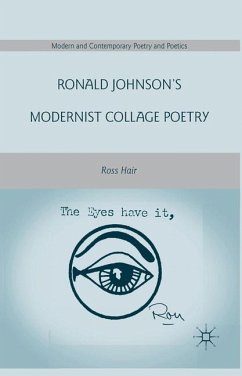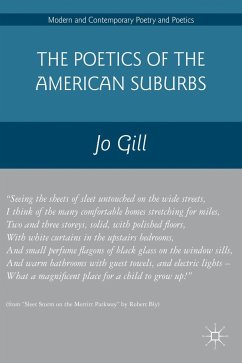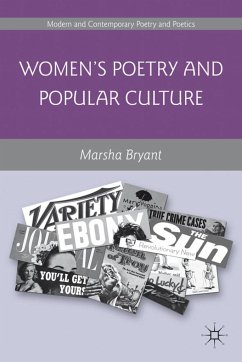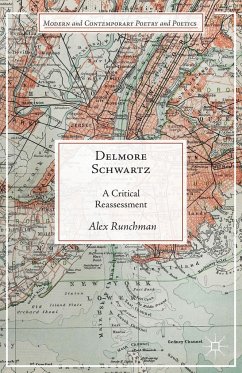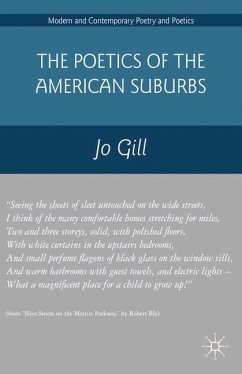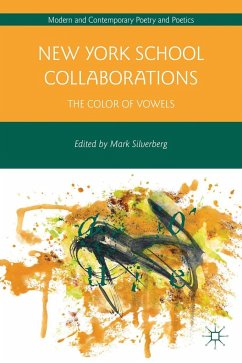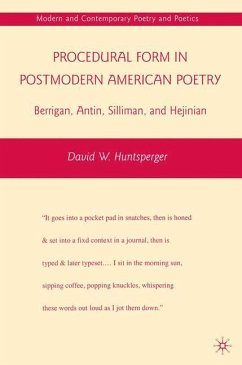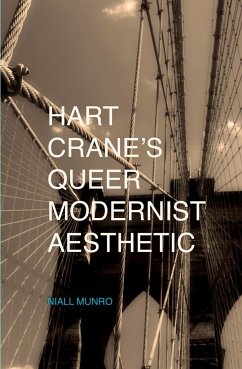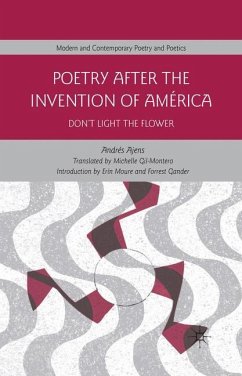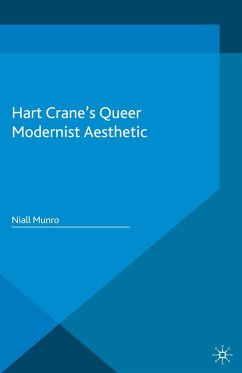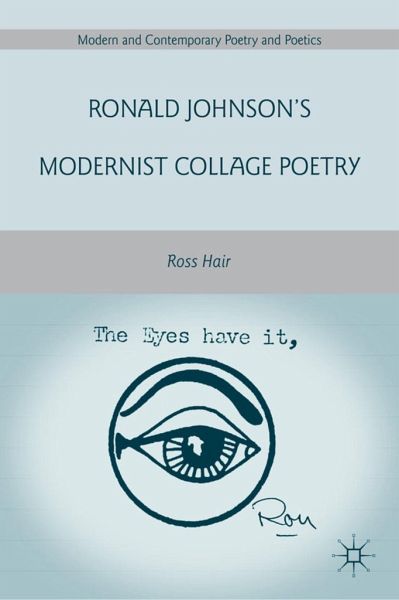
R. Hair
Gebundenes Buch
Ronald Johnson's Modernist Collage Poetry
Versandkostenfrei!
Versandfertig in 6-10 Tagen
Weitere Ausgaben:

PAYBACK Punkte
19 °P sammeln!





Using a critical examination of the collage poetics of Ronald Johnson, this book sets out to understand Johnson's poetry in the context of the "New American" collage tradition, stretching from Ezra Pound to Louis Zukofsky and beyond. Additionally, the book assesses Johnson's work in relation to wider questions concerning literary chronologies, especially the discontinuities commonly seen to exist between nineteenth-century Romantic and twentieth-century modernist literary forms.
Ross Hair is Lecturer in English at the University of Portsmouth.
Produktdetails
- Modern and Contemporary Poetry and Poetics
- Verlag: Palgrave Macmillan / Palgrave Macmillan US / Springer Palgrave Macmillan
- Artikelnr. des Verlages: 978-0-230-10869-1
- 2010 edition
- Seitenzahl: 256
- Erscheinungstermin: 19. Januar 2011
- Englisch
- Abmessung: 211mm x 145mm x 23mm
- Gewicht: 463g
- ISBN-13: 9780230108691
- ISBN-10: 0230108695
- Artikelnr.: 31387280
Herstellerkennzeichnung
Libri GmbH
Europaallee 1
36244 Bad Hersfeld
gpsr@libri.de
"Whitman's famous injunction - 'To have great poets, there must be great audiences' - can usefully be modified to say, 'Great poets require a great reader.' In this groundbreaking new book, Ross Hair proves himself to be the great reader Ronald Johnson's work has needed: someone to connect and synthesize the different traditions Johnson availed in creating his powerful poetry - from the Transcendentalists, to Pound and the Modernists, to concrete and visual poetries from mid-century - all the while alerting us to the central creative principle that drives Johnson's work. Namely, a recovery of an Edenic innocence enabled by unironic acts of assemblage and vision, where beauty and pleasure are the desired goals. Johnson was one of our finest
Mehr anzeigen
visionary poets; Hair's illumination of Johnson's 'ocularcentric concerns' shows us why, especially in the ways 'ocular' is transformed into 'oracular' in Johnson's generative poetics. Hair's sense of Johnson's work is as keen as it is profound; his readings of Johnson's work - especially of Johnson's major long works, including his masterpiece ARK - are invaluable for seasoned and uninitiated readers alike. Ronald Johnson's Modernist Collage Poetry will take its place as the Thoreauvian cornerstone for all subsequent understandings of Johnson's poetry." - Peter O'Leary, executor for the literary estate of Ronald Johnson, author of Gilding the Buddha: My Apprenticeship with Ronald Johnson
"In Ronald Johnson's Modernist CollagePoetry, the first book-length study of Johnson's work, Ross Hair ably demonstrates that Johnson's poetry 'proposes innocence as an epistemological condition, denoting a way of experiencing and responding to the world of events without prescription.' A visionary bricoleur and direct heir of the American Transcendentalists, Johnson brilliantly appropriated and revised the revolutionary principles of his modernist precursors (Pound, Williams, Moore, Zukofsky, Olson . . .), producing one generous vernacular masterpiece after another. Exploring archival materials, analyzing intertextual relations, and closely reading Radi os, The Book of the Green Man, and most importantly, ARK, Hair shows both new readers and those familiar with the work why Johnson is one of the most important poets of the second half of the twentieth century: an invaluable contribution to our understanding of contemporary American poetry." - Norman Finkelstein, Professor of English, Xavier University and author of On Mount Vision: Forms of the Sacred In Contemporary American Poetry
"'The test of poetry,' Louis Zukofsky once wrote, 'is the range of pleasure it affords as sight, sound, and intellection.' Page after page, Ronald Johnson's poetry passes that test with flying colors, and Ross Hair's new study shows how. Exploring the poet's relationships with Transcendentalism, the modernism of Pound, Olson, Zukofsky, and Moore, and with his poetic contemporaries, from Guy Davenport and the Language Poetsto British authors Thomas A. Clark and Geoffrey Grigson, this book invites us to rethink the story of American poetry since the 1960s, putting Johnson and his collage poetics center stage. Hair's sharp eye and attentive ear serve him well in deft close readings and in fresh archival discoveries (Harold Bloom was a fan? Who knew?), and he gives an illuminating, poignant account of the poet's occlusion in the 1980s and 1990s, as critical fashion passed him by. That time in shadow has passed, this groundbreaking book suggests. I am glad and grateful to see it." - Eric Murphy Selinger, co-editor of Ronald Johnson: Life and Works
"In Ronald Johnson's Modernist CollagePoetry, the first book-length study of Johnson's work, Ross Hair ably demonstrates that Johnson's poetry 'proposes innocence as an epistemological condition, denoting a way of experiencing and responding to the world of events without prescription.' A visionary bricoleur and direct heir of the American Transcendentalists, Johnson brilliantly appropriated and revised the revolutionary principles of his modernist precursors (Pound, Williams, Moore, Zukofsky, Olson . . .), producing one generous vernacular masterpiece after another. Exploring archival materials, analyzing intertextual relations, and closely reading Radi os, The Book of the Green Man, and most importantly, ARK, Hair shows both new readers and those familiar with the work why Johnson is one of the most important poets of the second half of the twentieth century: an invaluable contribution to our understanding of contemporary American poetry." - Norman Finkelstein, Professor of English, Xavier University and author of On Mount Vision: Forms of the Sacred In Contemporary American Poetry
"'The test of poetry,' Louis Zukofsky once wrote, 'is the range of pleasure it affords as sight, sound, and intellection.' Page after page, Ronald Johnson's poetry passes that test with flying colors, and Ross Hair's new study shows how. Exploring the poet's relationships with Transcendentalism, the modernism of Pound, Olson, Zukofsky, and Moore, and with his poetic contemporaries, from Guy Davenport and the Language Poetsto British authors Thomas A. Clark and Geoffrey Grigson, this book invites us to rethink the story of American poetry since the 1960s, putting Johnson and his collage poetics center stage. Hair's sharp eye and attentive ear serve him well in deft close readings and in fresh archival discoveries (Harold Bloom was a fan? Who knew?), and he gives an illuminating, poignant account of the poet's occlusion in the 1980s and 1990s, as critical fashion passed him by. That time in shadow has passed, this groundbreaking book suggests. I am glad and grateful to see it." - Eric Murphy Selinger, co-editor of Ronald Johnson: Life and Works
Schließen
Für dieses Produkt wurde noch keine Bewertung abgegeben. Wir würden uns sehr freuen, wenn du die erste Bewertung schreibst!
Eine Bewertung schreiben
Eine Bewertung schreiben
Andere Kunden interessierten sich für




